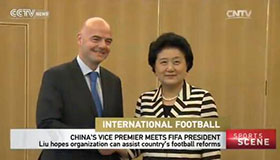KUALA LUMPUR, July 3 (Xinhua) -- The Belt and Road Initiative would be an impetus for world development and benefit Malaysia in a win-win relations with China, said a senior Malaysian official on Sunday.
The initiative had already fostered a series of cooperation between Malaysia and China, including the sister industrial parks in Qinzhou, China and Kuantan, Malaysia respectively, said Transport Minister Liow Tiong Lai in an interview with the Star, a local newspaper, which was published on Sunday.
Currently, Malaysia is China's third largest trading partner in Asia, after Japan and South Korea, and China is Malaysia's largest trading partner, accounting for some 20 percent of Malaysia's total exports.
In 2014, bilateral trade exceeded 100 billion U.S. dollars. The trade growth has moderated in the past two years, but Malaysia has seen increasing investment from China.
"All these can happen because of the Belt and Road Initiative," said Liow.
China's investments are both timely and crucial for Malaysia amid the global economic slowdown and dwindling foreign investments, the Star reported. Malaysia's exports fell 17.2 percent year on year in the first quarter of 2016, due partly to the sluggish demand for commodities.
Among major investment from China announced recently, China General Nuclear Power Corporation has acquired the underlying assets of Edra, a Malaysian company, including 13 clean energy projects scattered in Malaysia, Egypt, Pakistan, United Arab Emirates (UAE) and Bangladesh.
China Railway Group Limited (CREC), one of China's largest state-owned companies, announced a 2 billion-U.S. dollar investment in a future transportation hub of Malaysia's capital city Kuala Lumpur.
Liow said his country was keen on fostering an economic partnership with China, and had proposed more projects for China to consider. China has expressed its interest in the high speed rail linking Kuala Lumpur and Singapore, which is expected to cost more than 10 billion U.S. dollars.
Liow, who is also the president of the Malaysian Chinese Association, a leading ethnics Chinese political party, has been making frequent trips to Beijing to entice more direct investments into the country.
"We want China to not only take our projects, but also bring in soft loans and technology transfer. That is why we work with them," he said.
As transport minister, he expects the Belt and Road Initiative and investment to benefit Malaysia's ports and airports. It would benefit Malaysia and the ten-member Association of Southeast Asian Nations (ASEAN) as a whole by boosting connectivity through infrastructure development, he said.
"It brings Malaysia and ASEAN closer to China. When people from both sides are closer, there will be more economic opportunities."
According to Liow, Malaysia has wanted to push for a trans-national railway linking China's southeastern city of Kunming to Singapore since mid-1990s, but only recently saw real development after China pledged its support.
"Without China to spearhead this plan, it will need another 10 to 20 years for the project to come to fruition. I strongly believe that the Belt and Road is the impetus for development in the world," said Liow.
Malaysian Prime Minister Najib Razak has recently suggested building high speed rail linking Kuala Lumpur and the Thai capital of Bangkok.
"It's a win-win pact for us. It's never a one-sided agreement," he said commenting on the initiative.











